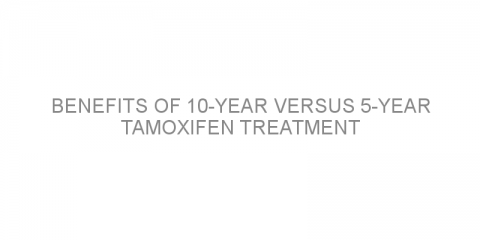In a nutshell This study evaluated whether there is any benefit from radiation therapy (RT) in women over the age of 70 with early stage breast cancer treated with lumpectomy (surgical removal of the cancerous lump) and tamoxifen. Some background Breast cancer in older patients is often fueled by estrogen, a female sex hormone. These cancer...
Read MoreTreatment(s) already received-Hormonal therapy Posts on Medivizor
Evaluating safety for High-Intensity Focused Ultrasound for patients with localized prostate cancer
In a nutshell This study examined the efficacy of High-Intensity Focused Ultrasound (HIFU) as primary (main) treatment for patients with localized (confined) prostate cancer (PCa). Some background Localized PCa is cancer confined to the prostate gland. Usually, standard treatment for this stage is surgery or radiotherapy. A newer treatment...
Read MoreThe outcome of salvage prostate cryotherapy is related to PSA levels before treatment
In a nutshell The study presented here investigated the predictive value of pre-treatment Prostate Serum Antigen (PSA) levels in patients with recurrent localized prostate cancer as a prognostic marker for successful salvage prostate cryotherapy. The authors found that a PSA level of < 5 ng/ml is a prognostic marker for a successful treatment...
Read MoreTestosterone as a treatment in men who have had prostate cancer, is it a viable option to improve men’s health?
In a nutshell This article reviews the use of testosterone treatment in men who have had prostate cancer. Although not currently used as a treatment method, there is a small amount of evidence which shows that it does not increase the risk of prostate cancer recurrence or progression. Some background Testosterone is produced largely by the...
Read MoreThe pathways followed by doctors in the diagnosis and treatment of recurring and metastatic breast cancer
This paper evaluates the process health care professionals follow to diagnose a cancer that reoccurs in the same location as a previous cancer (locally recurrent), or a cancer that has spread (metastasized). Despite earlier detection and improved treatment options for breast cancer, it is still the leading cause of cancer related deaths in...
Read MorePhase I trial to determine the safety of a new anti-cancer drug: PD 0332991
In a nutshell This article presents the results from the first human trial of PD 0332991, a new anti-cancer drug. The main objective of the study was to determine the safety and recommended dose for further testing. Results warrant further studies and revealed that neutropenia (low white cell count) was the main side effect. Some background Cells...
Read MorePersonalized Tamoxifen Treatments
Most patients on Tamoxifen receive a standard dose of medication. However, patients may benefit more from individually adjusted doses. This paper highlights potential strategies for personalized Tamoxifen treatments. Tamoxifen is not active on its own. Once ingested, the body converts it into other substances (metabolites). Some of these...
Read MoreEvaluating cancer outcomes and safety of laparoscopic prostatectomy in patients with recurrent prostate cancer
In a nutshell The present study evaluated the safety, adverse effects and cancer outcomes of Salvage Robotic Assisted Laparoscopic Radical Prostatectomy (sRALP) in patients with recurrent prostate cancer. The procedure was surgically safe, yet 18% of the patients had another recurrence within 16 months of surgery. Some background...
Read MoreThe association between insulin blood levels and risk of death in breast cancer patients
In a nutshell The present study evaluated the relationship between high insulin levels in the blood stream and the risk of cancer-related mortality. Its authors report that women with higher-than-normal insulin levels are at higher risk of death due to breast cancer. Some background Breast cancer has been shown to be more common in people who...
Read MoreComparison between different chemotherapy regimens for early breast cancer
In a nutshell The present study compared the long-term efficacy and safety of different adjuvant chemotherapy regimens for breast cancer. Main results: chemotherapy clearly provides survival benefits; the higher the dosage, the higher the survival rates, despite more toxicity. Some background Many women with early stage breast cancer receive...
Read MoreBenefits of 10-year versus 5-year Tamoxifen treatment
In a nutshell Tamoxifen treatment is given to many breast cancer patients after surgery to prevent recurrences and improve survival. It is usually given for a maximum of 5 years. This study determined that longer treatments offer further survival benefit. Some background Tamoxifen is a drug used against breast cancers which produce...
Read MorePostoperative radiotherapy prevents breast cancer recurrence and prolongs survival
In a nutshell This study evaluated if strategies to prevent cancer recurrence are associated with prolonged survival 15 years after treatment. Their main findings were that postoperative radiation managed to prevent cancer recurrence and was associated with higher rates of long-term survival. Some background Early breast cancer is often treated...
Read More











